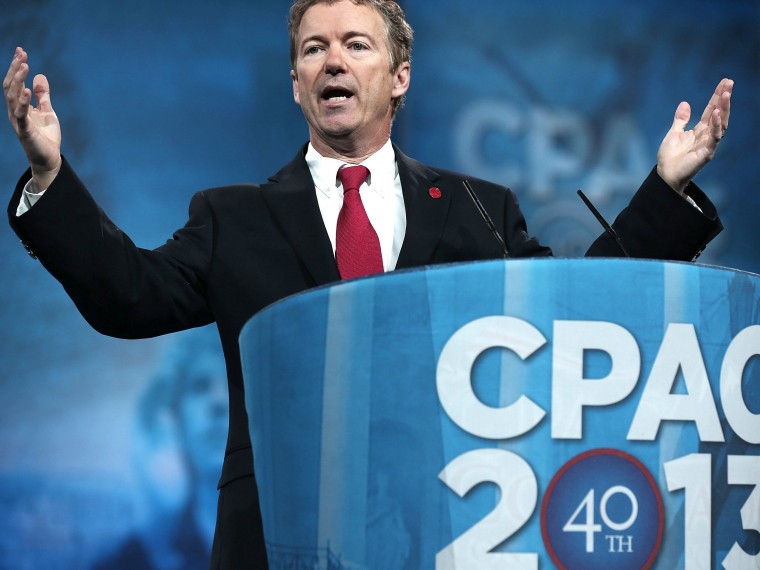It looks like Rand Paul is taking a page from Marco Rubio’s playbook.
The Kentucky senator and Tea Party favorite is taking a moderate approach on immigration, telling the U.S. Hispanic Chamber of Commerce on Tuesday that “immigration reform will not occur until conservative Republicans, like myself, become part of the solution.”
He said the conversation starts by “acknowledging we aren’t going to deport 12 million illegal immigrants” living in the country. “If you wish to work, if you wish to live and work in America, then we will find a place for you,” Paul added.
It’s a big change for libertarian-minded lawmaker, who in 2011 proposed a constitutional amendment that does away with birthright citizenship for the children of illegal immigrants.
So why now? Paul is riding a wave of popularity -- he's fresh off winning the CPAC straw poll and has been touted by several members on both sides of the aisle for his nearly 13 hour filibuster earlier this month. The looming question now is if Paul--who says he’s “seriously” considering running for president in 2016– will alienate his Tea Party base, including many who consider such plans amnesty.
“Interesting play by Rand Paul on immigration reform,” tweeted David Axelrod, President Obama’s former campaign adviser. “Endorsing path to citizenship is a big move. Popular with young, but not rest of base.”
Mark Krikorian, executive director of the Center for Immigration Studies, which promotes stricter immigration enforcement, tweeted “Rand Paul to join amnesty-pushers…Well, there goes his chance at the presidency.”
Still, several members within the Republican Party seem to be hedging toward a more moderate approach to immigration. After all, Obama won more than 70% of Hispanic votes in last year’s election. The Republican National Committee on Monday released a study examining what went wrong in 2012, and acknowledged that on immigration the party needs to “embrace and champion comprehensive” reform or else face the continuing “shrink to its core constituencies.”
Of course, Paul's plan isn’t without its caveats. He said there must be greater border security. Also, his plan won’t impose a national ID card and won’t have a mandatory E-Verify program to crack down on those who employ illegal immigrants. Under his plan, Congress would extend “probationary work visas” (a number determined by a bipartisan panel) to undocumented workers. Then, after a probationary period, immigrants would have to hold a green card for a minimum of five years before being granted citizenship.
Rubio, the popular Florida senator from Florida and potential 2016 nominee has also taken a more moderate approach to immigration, joining the bipartisan Gang of Eight, which will propose legislation next month. The group hopes to secure the border in addition to providing a pathway to citizenship for illegal immigrants. Unlike Paul, the plan will likely include measure to expand E-Verify.
Rubio did not address immigration at his CPAC address. Perhaps it's not surprising as his plan has come under fire from several in his party for the provision allowing an earned pathway to citizenship.
Paul, likely facing the same heat, did not mention the word “citizenship” once in his speech on Tuesday. In fact, the lawmaker’s spokesman Eleanor May insisted to Politico that Paul’s plan was not a path to citizenship.
“What his plan is extending to them is a quicker path to normalization, not citizenship and being able to to stay and work,” said May.
